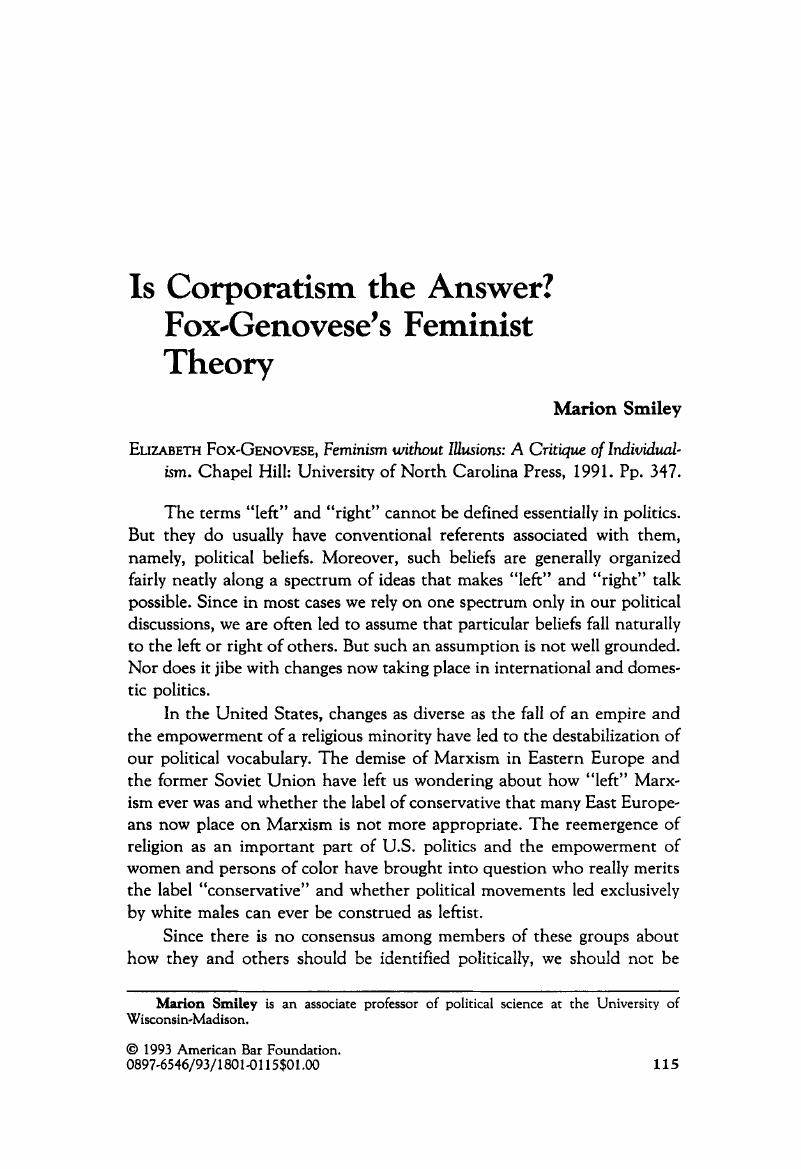No CrossRef data available.
Published online by Cambridge University Press: 27 December 2018

1 Du Bois, Ellen, “Fox-Genovese: Feminism without Illusions: A Critique of Individualism,” Nation 254 (1992), p. 57.Google Scholar
2 Feminist theorists often make such a possibility the central focus of their critiques of patriarchy. See, e.g., Zillah Eisenstein, Capitalist Patriarchy (New York: Monthly Review Press, 1979); Eli Zaretsky, Capitalism, the Family and Personal Life 2d ed. (New York: Harper & Row, 1986); and Gerda Lerner, The Creation of Patriarchy (Oxford: Oxford University Press, 1986).Google Scholar
3 Works on “difference” by contemporary feminists are many in number. For several of the best, see: Linda Nicholson, ed., Feminism/Postmodernism (London: Routledge, 1989); Iris Young, Justice and the Politics of Difference (Princeton, N.J.: Princeton University Press, 1990) (“Young, Justice”); and Martha Minow, Making All the Difference: Inclusion, Exclusion and American Law (Ithaca, N.Y.: Cornell University Press, 1990).Google Scholar
4 Bernard Yack argues that such a confusion between political theory and practice undermines the efforts of a variety of political theorists to ground their communitarianism in a critique of liberal theory. See, e.g., Bernard Yack, “Does Liberal Practice ‘Live Down’ to Liberal Theory?” in Charles Reynolds, ed., Community in America 147–69 (Berkeley: University of California Press, 1988).Google Scholar
5 Fox-Genovese mistakenly claims that Sandel embraces communal authority when she chastises feminists for not following “conservatives like Michael Sandel” in arguing for the authority of the individual over society (at 57). Sandel does often confuse ontological individualism with political individualism in his effort to criticize the latter on the basis of the former. In other words, he does, like Fox-Genovese, assume that he can conclude from the tendency of liberal theory to begin with discrete individuals that liberal practice is itself is anticommunitarian. But he does not assert the need for communal authority as distinct from communal traditions and identities.Google Scholar
6 Fox-Genovese begins by asserting both that “those who favor reproductive choice for women have rested their case squarely on the ground of an … absolute right to control their own sexuality and their own bodies” (at 81) and chat there is no such absolute right. Then she concludes, on the basis of these two assertions, that abortion must be decided on collectively. “Abortion confronts us with a collective social, economic, political and moral problem that we can solve only collectively” (at 85).Google Scholar
7 For an example of how one might both embrace a strong reproductive right and construe that right socially, i.e., treat that right as a communally constructed right, see Jaggar, Allison, “Sexual Equality,” 89 Ethics 275 (1979).Google Scholar
8 For the classical statement of these abuses, see Isaiah Berlin, “Two Concepts of Literty,” in Four Concepts of Liberty ch. 3 (Oxford: Oxford University Press, 1968).Google Scholar
9 Nedelsky makes this argument in “Reconceiving Autonomy: Sources, Thoughts and Possibilities,” 1 Yale J.L. & Feminism 7 (1989). Nedelsky does not, like Fox-Genovese, go so far as to impose duties of child rearing on women.Google Scholar
10 For a representative discussion of this possibility, see Young, Justice.Google Scholar
11 Interestingly enough, Hobbes himself recognized that any universal notion of justice that we prescribe to end such a “warre” would have to be artificial, imposed from above, and in no way an organic part of our community.Google Scholar